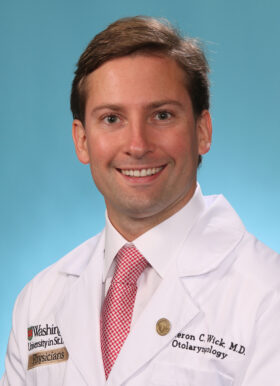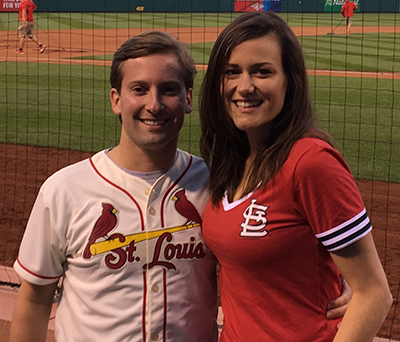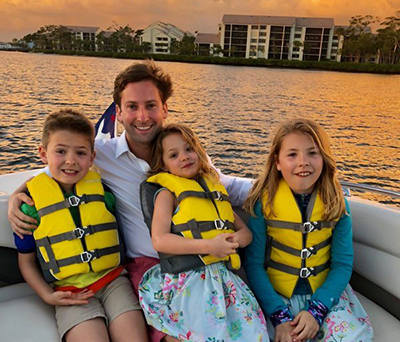Cameron Wick, MD

Cameron Wick, MD, is a surgeon whose areas of specialty include otolaryngology, adult and pediatric cochlear implants, head and neck surgery, skull base tumors, otology, neurotology, and ear, nose and throat.
What happened in the course of schooling to make you choose your specialty?
I was a neuroscience major in college and for one class I was assigned a project on cochlear implantation and hearing physiology. That did it for me. I was amazed by the intricacies of hearing and that technologies were available to restore its function.
Personally, I have always loved music and actually produced a student-run music festival throughout college. Initially I thought how amazing it would be to bring music back into people’s lives. While that remains true, I get as much or more enjoyment from patients describing socializing with their family and friends again because they can hear.
I must also acknowledge that I have had many influential teachers throughout my schooling and medical education. Their patience and dedication to my education had a strong influence on me wanting to help teach medical students, residents, and fellows.
What brought you to Washington University?
The otology division of our Otolaryngology – Head and Neck Surgery department was growing and it provided an opportunity for me to join a well-established cochlear implant team with many leaders in the field.
When I learned more about the department, it really was a perfect match because it was an academic medical practice that facilitates resident and fellow teaching and allows me to work with gifted colleagues to answer research questions that will hopefully advance our field.
My wife is also in medicine and was able to transfer into a residency program at Washington University. That sealed the deal and we both feel very fortunate to be here.

Which aspect of your practice is most interesting?
Hearing restoration remains the most gratifying and interesting aspect of my practice. Hearing is such a complex process and each patient presents a little puzzle that I get to solve. I love helping patients understand why they have a hearing loss, what type of hearing loss it is, and what I can do to fix it.
What new developments in your field are you most excited about?
There are many! I am involved with research on cochlear implant outcomes and lateral skull base pathology. One active project I am leading blends those specific interests and utilizes the multidisciplinary skull base team developed at Washington University.
This project is developing a novel cochlear nerve monitoring system for translabyrinthine vestibular schwannoma (acoustic neuroma) resections. The hope is that with better cochlear nerve monitoring we can keep the nerve intact during the resection, which means it could benefit from a cochlear implant. This has potential to address the main quality of life factors relevant to vestibular schwannoma care, specifically hearing loss, tinnitus, and balance.
Another development that excites me is the increased use of minimally invasive endoscopes for ear surgery. Endoscopes have the advantage of providing a great view of the tiny ear structures and ear disease. In some instances, I can work with the endoscopes and go directly through the ear canal to reach and fix the ear problem. This technique saves the patient having to have an incision behind the ear and potentially reduces his or her surgical pain. It is also great for teaching the residents because they see structures with the endoscope that they never appreciated through traditional microscopic approaches.
Finally, our department is always trying to improve patient access. We treat patients from all over the country and I have begun to explore a possible role for telemedicine encounters for some patients with hearing loss. This would be a niche subset of patients but has potential to deliver care to patients previously unable to make multiple trips to St. Louis for treatment.
Where are you from originally?
Cleveland, Ohio. My parents, brothers, nieces, and nephew still live there. I remain a diehard Cleveland sports fan but have gladly adopted the Cardinals as my National League baseball team and the Blues as my hockey team. I am not superstitious, but my rooting for the Blues did coincide with their first missed playoff appearance in six years…
Which particular award or achievement is the most gratifying to you?
I still go back to athletic championships, particularly state titles in football and baseball while growing up in Ohio. The learned disciplines of training, team management, and perseverance to succeed remain very applicable to my daily work. Like sports, surgery and the practice of medicine are team efforts. It brings me such joy to see my staff share in the positive patient outcomes because, just like myself, they are emotionally invested in trying to make patients’ lives better.

What is the best advice you have ever received?
Be genuine. Anyone can put on a happy face for a while, but to be passionate about what you do and who you are every day requires being true to yourself.
My mother also told me I would not be an NBA player. This was low-hanging fruit when it comes to advice, but I still laugh and appreciate her bluntness.
If you weren’t a doctor, what would you like to be doing?
A chef. I love the creativity of cooking. I also like to entertain and definitely like to eat. When discussing this with my wife, she jokes that my secondary career is probably as rough on nights, weekends, and holidays as my choice to be a surgeon. Maybe I am a glutton for punishment.